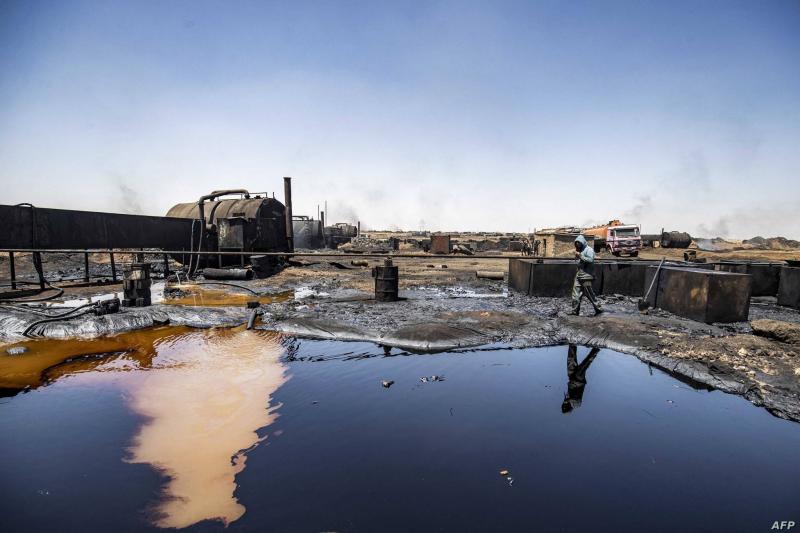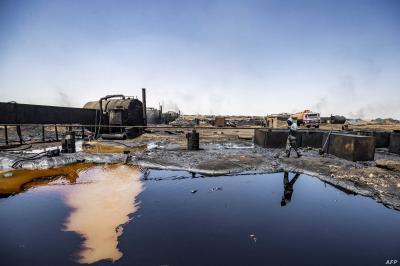Under the title "Black poison creeps slowly.. and death threatens village residents in northeast Syria," the website Al-Hurra reported that before the outbreak of the war in Syria, the village of Kharab Abu Ghalib in the Hasakah governorate, in the northeast of the country, was known for its green pastures and natural scenery that attracted people for recreation. However, the war changed the landscape, turning it into a dangerous hotspot for a harmful toxin that creeps slowly.
The condition of this small village and the surrounding areas changed after a watercourse turned into a black river cutting through agricultural lands, carrying quantities of leaking oil that pose a health risk to the residents. According to local residents, a nearby oil facility caused this destruction of nature, attributing the rising death toll to oil leaks and burning operations at the facility due to toxins penetrating the area’s air. This was highlighted in a report by the Independent newspaper.
The newspaper's correspondent noted the passing of two funerals near the oil leak stream, a reminder of the fate of residents surrounded by danger, with no prospect of a solution to this environmental problem that is decimating life in the area. The correspondent stated that four days before her arrival, an elderly man and a middle-aged woman died due to breathing difficulties, chest problems, and kidney failure.
A resident named Ayman told the newspaper, being the nephew of one of the deceased, that the village witnessed the deaths of 10 people last year—a significant number. Livestock have perished, and agricultural lands have turned barren. The young man added, standing next to the toxic river, "We don't know the exact cause of their deaths, but we know it's linked to this pollution, which weakens our lungs and immunity."
The foul odor of oil attacks the residents in their homes, depriving them of fresh air and disturbing their sleep. Ayman said, "We cannot sleep at night due to the smell; we are worried because this makes us more vulnerable to catching the coronavirus." The village where Ayman lives is close to the Rmeilan fields, which are suffering from severe leaks, having flooded with crude oil in 2020. Additionally, the village is about 10 miles away from the Khor Ziro oil facility, the main oil storage site in northeast Syria, located in an area controlled by the Kurdish self-administration.
In these regions, warplanes intentionally targeted oil facilities, damaging storage tanks, pipelines, and machinery, leading to dangerous leaks visible in the lands of neighboring villages. When ISIS took control of the area in 2014, they used the existing equipment to extract and refine oil unsafely to generate revenue for the extremist group. The conflict in Syria has led to the destruction of oil production in this region, which produced around 400,000 barrels per day before the war, now estimated to have decreased to about 20,000 barrels, according to experts in the oil sector.
The ongoing crisis, violent fighting, and lack of investment (often due to concerns over sanctions on Syria) have led to minimal reconstruction or maintenance of the few facilities that still operate in those regions, resulting in oil leaks that now pose a significant risk to both the environment and the health of residents. The destruction of official refineries and the pipeline to the main refinery in Homs has led to the emergence of thousands of temporary refineries, each of which dumps waste onto the ground, including heavy metals known to be cancer-causing, such as mercury, lead, and arsenic, as reported by the Independent.
Gas is also burned, including sulfur dioxide and nitrogen oxides, as well as by-products of oil production and refining being released into the atmosphere.
An Unprecedented Threat
Compounding the problem, Syria has recently experienced an unprecedented drought, leading to a severe water shortage, especially as experts have warned that oil leaks threaten groundwater, which, if mixed with oil substances, will render it unusable for residents. Wim Zwijnenburg from the Dutch peace organization PAX, which prepared a report warning of the cumulative impact of oil pollution in northeastern Syria, stated that “the oil pollution coming from the nearby oil storage facility at Khor Ziro was an unusual threat to local residents.”
He added that “the neglect of infrastructure and the blockade created severe environmental pollution. Even after the fighting calmed, civilians in the area continued to face a different kind of danger characterized by its toxicity and slow creep.” The Independent asked the Kurdish self-administration about the problem, where officials acknowledged its existence but declined to comment on how they are addressing this deadly threat.
Experts in the oil industry told the newspaper that authorities and individuals managing oil facilities in those areas lack funding, resources, and support to address such a complex issue and need international assistance. Local residents confirmed that efforts were made before the civil war to address the oil pollution that has plagued the region for a long time, but the fighting between Syrian regime soldiers and opposition fighters in the early years of the war, followed by ISIS's takeover in 2014, led to the destruction of everything, and the efforts faded, while “the black poison continues to creep slowly, with no one to stop it.”




